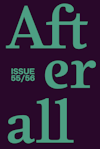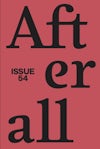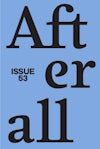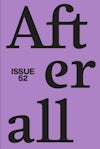
Issue 17
Spring 2008
Editors: Charle Esche, Thomas Lawson, Mark Lewis, Dieter Roelstraete, Pablo Lafuente.
Founding editors: Charles Esche, Mark Lewis.
Table of contents
Foreword
Contextual Essays
- On American Ingenuity (And the Problem of the Readymade) – Walead Beshty
- Whatever Happened to Sex in Scandinavia? I Am Curious (Yellow) – Marta Kuzma
Artists
Hans-Peter Feldmann
- Art In and Out of the Age of Terror – Dieter Roelstraete
- Hans-Peter Feldmann’s Pictures – Ruth Horak
Bjarne Melgaard
- The Gentle Art of Breeding Monsters: Bjarne Melgaard and the Political – Bart De Baere
- Working Class Abstractions – Ina Blom
Gerard Byrne
- You See? Gerard Byrne’s Reconstructions – Bettina Funcke
- Why It’s Time for Realism, Again – Maria Muhle
Lutz Bacher
- My Secret Life: Lutz Bacher – Lia Gangitano
- Read This Last – Anthony Huberman
Events, Works, Exhibitons
- ‘Are You Happy?’: Notes On Öyvind Fahlström’s Mao-Hope March – David Bussel
- On Feminism (Through a Series of Exhibitions) – Annie Fletcher
- Phantom Limb: Michael Asher’s Sculpture Project – Stephan Pascher
Foreword
Written by Pablo Lafuente
This spring marks forty years since the events of May ’68. On the occasion of this anniversary, during the upcoming months there will likely be numerous articles published in magazines and papers…
This spring marks forty years since the events of May ’68. On the occasion of this anniversary, during the upcoming months there will likely be numerous articles published in magazines and papers, as well as symposia and discussions assessing – once more – the legacy of a time that saw diverse social movements take to the streets in France, but also in Eastern and Western Europe, the United States and South America. Perhaps this time the conventional image of May ’68 as a youth revolt will be accompanied by a wider reflection on the socio-political implications of a movement that was not exclusively a students’ initiative, but, importantly, a coming together of students and workers as part of an egalitarian move that questioned the existing social order and proposed an alternative way of understanding what it means to live together.
What seems for us important about May ’68 are both its responsive character to concrete situations – to what was going on, for example, in Vietnam or, in the French context, to the recent history of the Algerian war – and its belief that another model was possible, one that blurred the distinctions between different social strata and questioned entitlements and assumed capacities. The students and intellectuals who took up jobs in assembly lines in factories – a process known as établissement soixantehuitard as a libertarian hedonist, by claiming that exchange between different groups and the conflictive sharing of interests between them constituted the way to effect social change.
When this issue of Afterall was planned, May ’68 was not part of the editorial discussion, but it is perhaps not surprising that a number of the artists and topics featured in the following pages engage with the events and their legacy. Perhaps not surprising because the history of the liberation movements of the 1960s and 70s and the theoretical discourses that converge around May ’68 are often the default framework in which politics is understood within art today. Nostalgia for a more optimistic time and regrets for missed opportunities provide a possible prism through which to look at both that moment in time and the work featured in this issue – although a more nuanced picture is offered by Marta Kuzma’s discussion of sexual liberation movements and Annie Fletcher’s of feminist art practice, as well as in the reconsiderations of Michael Asher’s Skulptur Projekte Münster caravan piece or Öyvind Fahlström’s parading of Bob Hope and Mao Tse-Tung along the streets of New York.
Purchase
The publication is available for purchase. If you would like specific articles only, it is also available individually and to be downloaded as PDFs.
Purchase full publication
Buy via University of Chicago Press
Buy via Central Books
Purchase individual articles
Buy via University of Chicago Press



